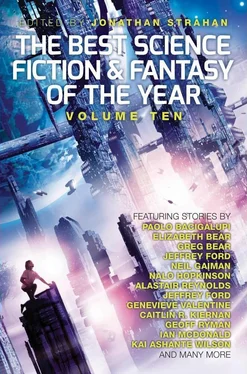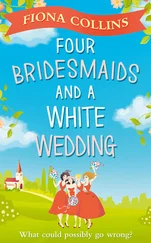Catherynne M. Valente
CATHERYNNE M. VALENTE((www.catherynnemvalente.com) is the New York Times bestselling author of over two dozen works of fiction and poetry, including Palimpsest , the Orphan’s Tales series, Deathless , Radiance , and the crowdfunded phenomenon T he Girl Who Circumnavigated Fairyland in a Ship of Her Own Making . She is the winner of the Andre Norton, Tiptree, Mythopoeic, Rhysling, Lambda, Locus, and Hugo awards. She has been a finalist for the Nebula and World Fantasy Awards. She lives on an island off the coast of Maine with a small but growing menagerie of beasts, some of which are human.
WAR IS A dinner party.
My ladies and I have spent the dregs of summer making ready. We have hung garlands of pennyroyal and snowberries in the snug, familiar halls of Laburnum Castle, strained cheese as pure as ice for weeks in the caves and the kitchens, covered any gloomy stone with tapestries or stags’ heads with mistletoe braided through their antlers. We sent away south to the great markets of Mother-of-Millions for new silks and velvets and furs. We have brewed beer as red as October and as black as December, boiled every growing thing down to jams and pickles and jellies, and set aside the best of the young wines and the old brandies. Nor are we proud: I myself scoured the stables and the troughs for all the strange horses to come. When no one could see me, I buried my face in fresh straw just for the heavy gold scent of it. I’ve fought for my husband many times, but each time it is new all over again. The smell of the hay like candied earth, with its bitter ribbons of ergot laced through – that is the smell of my youth, almost gone now, but still knotted to the ends of my hair, the line of my shoulders. When I polish the silver candelabras, I still feel half a child, sitting splay-legged on the floor, playing with my mother’s scorpions, until the happy evening drew down.
I am the picture of honor. I am the Lily of my House. When last the king came to Laburnum, he told his surly queen: You see, my plum? That is a woman. Lady Cassava looks as though she has grown out of the very stones of this hall. She looked at me with interested eyes, and we had much to discuss later when quieter hours came. This is how I serve my husband’s ambitions and mine: with the points of my vermilion sleeves, stitched with thread of white and violet and tiny milkstones with hearts of green ice. With the net of gold and chalcathinite crystals catching up my hair, jewels from our own stingy mountains, so blue they seem to burn. With the great black pots of the kitchens below my feet, sizzling and hissing like a heart about to burst.
It took nine great, burly men to roll the ancient feasting table out of the cellars, its legs as thick as wine barrels and carved with the symbols of their house: the unicorn passant and the wild poppy. They were kings once, Lord Calabar’s people. Kings long ago when the world was full of swords, kings in castles of bone, with wives of gold – so they all say. When he sent his man to the Floregilium to ask for me, the Abbess told me to be grateful – not for his fortune (of which there is a castle, half a river, a village and farms, and several chests of pearls fished out of an ocean I shall never see) but for his blood. My children stand near enough from the throne to see its gleam, but they will never have to polish it.
My children. I was never a prodigy in the marriage bed, but what a workhorse my belly turned out to be! Nine souls I gave to the coffers of House Calabar. Five sons and four daughters, and not a one of them dull or stupid. But the dark is a hungry thing. I lost two boys to plague and a girl to the scrape of a rusted hinge. Six left. My lucky sixpence. While I press lemon oil into the wood of the great table with rags that once were gowns, four of my sweethearts giggle and dart through the forest of legs – men, tables, chairs. The youngest of my black-eyed darlings, Mayapple, hurls herself across the silver-and-beryl checked floor and into my arms, saying:
“Mummy, Mummy, what shall I wear to the war tonight?”
She has been at my garden, though she knows better than to explore alone. I brush wisteria pollen from my daughter’s dark hair while she tells me all her troubles. “ I want to wear my blue silk frock with the emeralds round the collar, but Dittany says it’s too plain for battle and I shall look like a frog and shame us.”
“You will wear vermillion and white, just as we all will, my little lionfish, for when the king comes we must all wear the colors of our houses so he can remember all our names. But lucky for you, your white will be ermine and your vermillion will be rubies and you will look nothing at all like a frog.”
Passiflora, almost a woman herself, as righteous and hard as an antler, straightens her skirts as though she has not been playing at tumble and chase all morning. She looks nothing like me – her hair as red as venom, her eyes the pale blue of moonlit mushrooms. But she will be our fortune, for I have seen no better student of the wifely arts in all my hours. “We oughtn’t to wear ermine,” she sniffs. “Only the king and the queen can, and the deans of the Floregilium, but only at midwinter. Though why a weasel’s skin should signify a king is beyond my mind.”
My oldest boy, Narcissus, nobly touches his breast with one hand while he pinches his sister savagely with the other and quotes from the articles of peerage. “‘The House of Calabar may wear a collar of ermine not wider than one and one half inches, in acknowledgement of their honorable descent from Muscanine, the Gardener Queen, who set the world to growing.’”
But Passiflora knows this. This is how she tests her siblings and teaches them, by putting herself in the wrong over and over. No child can help correcting his sister. They fall over themselves to tell her how stupid she is, and she smiles to herself because they do not think there’s a lesson in it.
Dittany, my sullen, sour beauty, frowns, which means she wants something. She was born frowning and will die frowning and through all the years between (may they be long) she will scowl at every person until they bend to her will. A girl who never smiles has such power – what men will do to turn up but one corner of her mouth! She already wears her red war-gown and her circlet of cinnabar poppies. They brings out the color in her grimace.
“Mother,” she glowers, “may I milk the unicorns for the feast?”
My daughter and I fetch knives and buckets and descend the stairs into the underworld beneath our home. Laburnum Castle is a mushroom lying only half above ground. Her lacy, lovely parts reach up toward the sun, but the better part of her dark body stretches out through the seastone caverns below, vast rooms and chambers and vaults with ceilings more lovely than any painted chapel in Mother-of-Millions, shot through with frescoes and motifs of copper and quartz and sapphire and opal. Down here, the real work of war clangs and thuds and corkscrews toward tonight. Smells as rich as brocade hang in the kitchens like banners, knives flash out of the mist and the shadows.
I have chosen the menu of our war as carefully as the stones in my hair. All my art has bent upon it. I chose the wines for their color – nearly black, thick and bitter and sharp. I baked the bread to be as sweet as the pudding. The vital thing, as any wife can tell you, is spice. Each dish must taste vibrant, strong, vicious with flavor. Under my eaves they will dine on curried doves, black pepper and peacock marrow soup, blancmange drunk with clove and fiery sumac, sealmeat and fennel pies swimming in garlic and apricots, roast suckling lion in a sauce of brandy, ginger, and pink chilis, and pomegranate cakes soaked in claret.
Читать дальше












